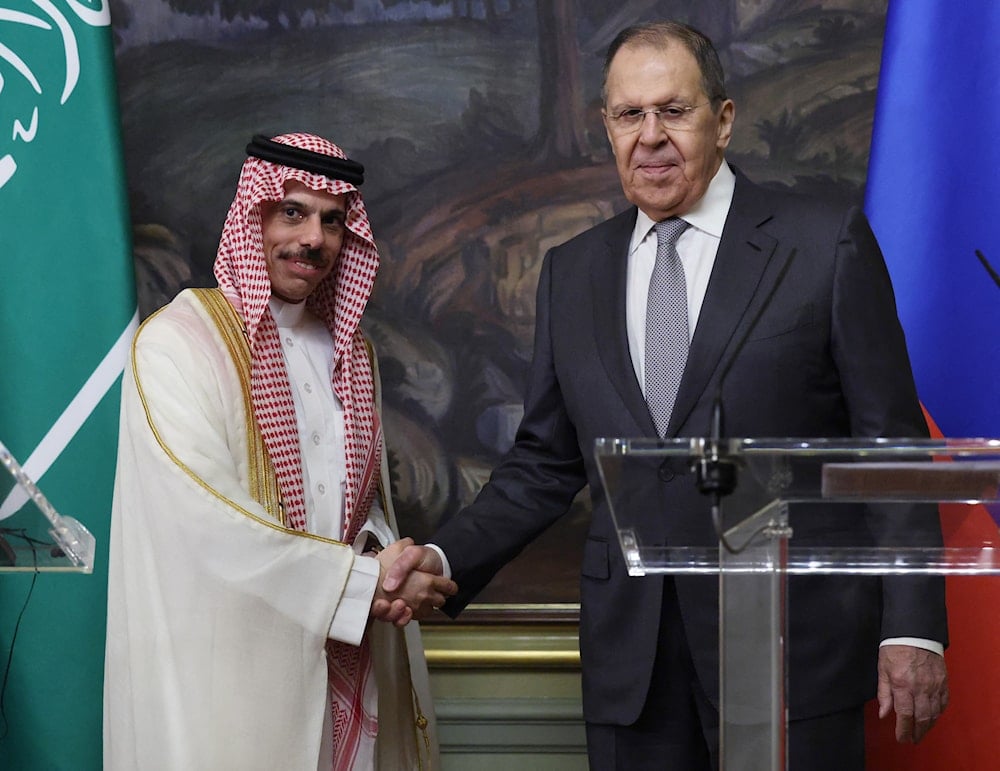Russia, Saudi Arabia on same page over Gaza ceasefire, Iran diplomacy
Moscow and Riyadh stress the need to end the war on Gaza, support a Palestinian state, and promote diplomacy over military action in the Iranian nuclear file.
-

Russia's Foreign Minister Sergey Lavrov shakes hands with Saudi Arabia's Foreign Minister Prince Faisal bin Farhan Al Saud during a joint press conference following their meeting in Moscow on July 4, 2025 (POOL / AFP)
Russian Foreign Minister Sergey Lavrov expressed hope that the recent ceasefire between "Israel" and Iran would open the path to negotiations.
Speaking during a joint press conference in the Russian capital with his Saudi counterpart, Lavrov noted that Moscow and Riyadh share close positions on the situation in Gaza, particularly the urgency of ending the war and delivering humanitarian aid.
He expressed hope that Saudi Arabia will be represented at the first Russian-Arab summit to be held in Moscow, emphasizing that Russia will continue efforts to ensure its national security and prevent a recurrence of measures previously taken against Russian citizens in Ukraine.
The top Russian diplomat also voiced hope that European countries would learn lessons from the recent confrontation between "Israel" and Iran, affirming Russia’s commitment to doing everything possible to advance the diplomatic track.
Saudi Arabia: Negotiated solutions are key to Iranian nuclear file
On his part, Saudi Foreign Minister Faisal bin Farhan stated that the current developments necessitate greater coordination, praising the strengthening of relations with Russia and highlighting cooperation in multiple fields.
He reiterated Saudi Arabia’s firm support for the Palestinian people’s right to establish an independent state in accordance with the Arab Peace Initiative and to end the Israeli occupation.
Bin Farhan stressed that the only sustainable solution is through the establishment of a Palestinian state, noting that anything short of that merely postpones the problems.
He also emphasized the Kingdom’s rejection of military solutions and its support for negotiated approaches concerning Iran’s nuclear program.
The Saudi top diplomat affirmed that Saudi Arabia's priority is achieving a sustained ceasefire in Gaza while acknowledging Russia’s important role on the international stage and its contributions to advancing stability in the Middle East.
Russia accuses UK, France, Germany of complicity in strikes on Iran
In a related context, Russian Ambassador to London Andrey Kelin has accused the United Kingdom, France, and Germany of contributing to the escalation that led to US and Israeli strikes on Iran, effectively labeling them as complicit in these acts.
In a statement to TASS, Kelin criticized what he described as "blatant violations of international law" accepted by London without objection.
"These blatant violations of international law were accepted by London without any objections. But the British are not in a hurry to get involved in a major war in the Middle East either. So literally in the first hours following the [US] attack, London rushed to claim non-involvement in the shelling of Iran’s nuclear facilities at all levels," he stated.
Despite those denials, Kelin asserted that deeper investigation reveals a different picture, particularly considering the Eurotroika's (UK, France, Germany) sustained efforts to discredit Iran's nuclear program.
"This effectively makes these countries accomplices in this aggression," he added.
Vienna negotiations and IAEA resolution cited as pretext
According to the ambassador, prior to the US and Israeli strikes, representatives from the Eurotroika engaged in talks with Iran in Vienna. Political directors from London, Berlin, and Paris reportedly pressured Tehran on several fronts.
Their aim, Kelin indicated, was to influence the International Atomic Energy Agency (IAEA) to assert in its report that it could not fully confirm the absence of an Iranian nuclear weapons program.
"It was precisely the most recent resolution of this kind that was used to justify American strikes on Iran," he said.
Kelin also criticized what he called an ongoing anti-Iranian campaign in Western capitals. "Apparently, the plans of the British leadership have long ceased to include fostering a fair and equitable dialogue with Iran, much like with Russia," he concluded.
Read more: Araghchi criticizes EU's remarks on Iran nuclear talks

 4 Min Read
4 Min Read









